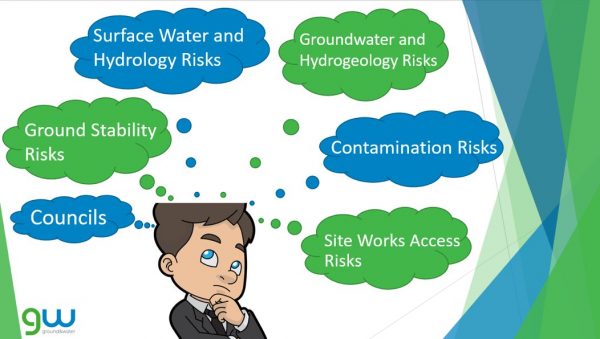BIA Screening and Scoping Assessments
Geoenvironmental • Geotechnical • Regulation
In our last blog, we explained what a Basement Impact Assessment (BIA) is. BIAs use desk based resources to assess the impact the basement development has on its surroundings and setting, but it also assesses the impact the setting will have on the basement. So what does this mean?
A BIA generally comprise three parts:
- A Screening Assessment to identify risks
- A Scoping Assessment to identify how each risk can be assessed during the site investigation
- Recommendations following the Site Investigation.
Screening and Scoping Assessments

The following are usually questions that get asked during a Screening/Scoping Assessment.
1. Potential issues relating to surface water include:
- Will there be changes to surface water flow route?
- Will there be changes to the amount of surface water?
- Will there be changes to inflow of surface water to assets/watercourses downstream?
- Will there be changes in the quality of the surface water?
- Is the area known to be at risk from surface water flooding?
- Is the site within a Critical Drainage Area (CDA)?
- Is the site within a Local Flood Risk Zone (LFRZ)?
2. Potential issues relating to groundwater include:
- Will the underlying hydrogeology/aquifers lead to shallow groundwater?
- Will the basement extend into saturated zones of underlying aquifers?
- Will there be an effect on the baseflow of watercourses, wells, ponds or spring lines?
- Will there be a change to the amount of surface water draining into soils (i.e. SUDS and soakaways)
3. Potential issues relating to stability include:
- Is the existing slope on-site or around the site greater than 7°?
- Will there be any reprofiling/landscaping making slopes greater than 7°?
- Will any trees be removed/planted/retained as part of the proposed development?
- Is there a history of shrink/swell subsidence on-site are the surrounding area?
- Will shallow groundwater cause instability issues during excavation?
- Is the site within an area of previously Made Ground?
- Will there be an increase to differential foundation depth between the proposed development and the surrounding properties?
- Are any other assets surrounding the site (i.e. roads, footpaths, services)?
- Is the site over or within an exclusion zone of any tunnels and underground railway lines?
Some councils have specific concerns relating to localised issues (i.e. Hampstead Heath Ponds in Camden, throughflow in Richmond).
Some councils have specific questions that require direct comment. This mainly relates to Camden, Westminster, RBKC and Richmond… but more may follow! Some councils also have auditors (Camden).
What is a Scoping Assessment?
The Scoping section provides information on how each risk will be assessed during the site investigation. It is very similar to the geotechnical risk assessments we sometimes provide for complex projects. This assessment clarifies:
- What risks are scoped into the investigation
- Discussion on how each risk will be assessed, often in combination with / referral to other important accompanying documents (e.g. CMS, Flood Risk Assessment etc).
The information used to undertake a Screening/Scoping Assessment includes region and site specific information including (but not limited too):
Region Specific
- Council Documentation (SFRA, SWMP, PFRA, SPD for Basement and Subterranean Developments)
- Documentation of Historical and Subterranean Rivers
- Geological Maps
- Hydrogeological Maps
- Topographical Maps
- Historical Mapping
- UXO Websites
- London Underground Mapping.
Site Specific
- Comprehensive description of the proposed development
- Existing and Proposed Development Plans, Sections and Elevations
- Site/Area Walkover
- Structural Calculations and TEDDS outputs
- Construction Method Statement (CMS)
- Landscaping plans (proposed and current)
- Arboricultural surveys.
The Ground & Water Difference
Ground & Water has a very good track record when it comes to BIAs and Screening and Scoping Assessments. In a nut shell we do them properly and the proof in this particular pudding, is the vast majority are agreed by the authorities. Using our experience, diligence and expertise will save you time and money in the long term and give you the best chance of securing that all important planning approval for your basement development.
